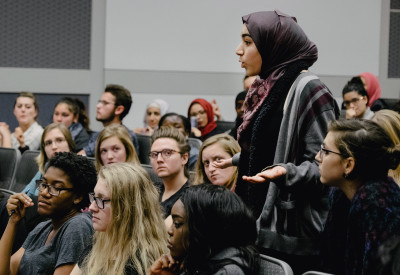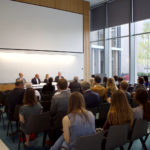
Amid controversy surrounding the Boston University Student Government, a few students remain positive about the possible reform of SG. The impeachment and resignations of several members of the Executive Board and a number of protests led to open conversations about SG’s performance to serve the student body.
Disputes initially started with Senate’s impeachment of former Vice President of Finance Kimberly Barzola and former VP of Internal Affairs Marwa Sayed for failing to fulfill their constitutionally mandated tasks. A day after the impeachment, approximately 30 students in BU Students Against Silence rallied in protest of the impeachment decision Nov. 10 and wrote, “BU Student Government, as it currently stands, does not represent me,” in a petition against SG.
Following the impeachment, a series of resignations of several SG members ensued: former Senate Chair Stephen Chang, former Judicial Commissioner Louis Vitti and former Co-Director of Social Affairs Noor Toraif.
Marian Eiben, a Towers Residence Hall Association senator, said students within SG are “looking at one another” as if there are opposing factions surrounding the matter.
“There’s so much tension and so much build up has happened that it’s hard for anybody to move in any one direction,” said Eiben, a sophomore in the Questrom School of Business. “The issue at hand is that we need to reassess and come together and say, ‘Okay we might not agree now, but how do we move forward from this?’”
Eiben was also a member of the student coalition that presented the “A Chance for Change” proposal Monday that would have dissolved Senate, created a task force to reconstruct SG Constitution and allocated $5,000 to E-Board to continue Senate’s initiatives in its vacancy. Senate voted to table the proposal for two weeks.
Seven student groups have joined BU SAS in protesting SG, claiming that there is “an alarming disconnect” between senators and the represented constituents. In a photo posted on BU SAS’s Facebook page Tuesday, Amnesty International BU, Iranian Students Association at BU, Divest BU, People of Color Coalition at BU, BU African Students Organization, Trans* Listening Circle and BU Students for Justice in Palestine, announced that “BU Student Government does not represent us.”
Yasmin Gentry, a senior in the College of Communication and former SG communications director, said the negative energy towards SG is not constructive to move forward.
“There has been a lot of anger and anger has sprouted from many different sides,” Gentry said. “The way the impeachment erupted and just occurred this past week has been crazy. People are feeling a little disheartened not just within the student body but also within the SG.”
SG President Andrew Cho appointed Gentry and former Chief of Staff Akiko Endo to fill the vacancy in VP of finance and VP of internal affairs, respectively, Tuesday.
Zachary Treichel, a sophomore in the College of Arts and Sciences and a CAS senator, said tabling to vote the proposal allows senators to talk to their constituents before casting a vote.
“There was no way we could pretend to amend it and then approve that proposal or even deny that proposal without consulting the people,” Treichel said. “I know the group of students who were at the meeting wanted an answer now, but there’s no way to just make that change happen without talking to everybody.”
Several students said SG needs to show its ability to represent BU students in an unbiased fashion to regain back its legitimacy and students’ trust.
Nicholas Ganey, a junior in CAS and a member of BU SAS, said he has now realized the impact SG has on students’ lives and remains optimistic on the prospect of the task force and a new SG Constitution.
“I am disheartened to see senators silence the voices of all of the students in the university who can participate directly in the writing of the new constitution,” Ganey said. “I wholeheartedly believe that a new constitution written for the students, by the students, is what’s best.”
Christina Lester, a junior in COM, expressed her frustration about the unequal number of Senate representatives assigned to each student.
“Some students have more senators than other students,” Lester said. “If you’re not representing your constituents and not going for what your constituents want, you’re not doing your job as a senator. If you’re afraid, then you don’t need to be a senator”
Priest Gooding, a sophomore in CAS, said the silver lining to the controversy is that students have become aware of SG’s matters. However, recent events also reflect SG members’ insufficient knowledge of their own constitution.
“[SG has] shown, especially tonight, that they really don’t have a firm understanding of the constitution that they’re supposed to be upholding and representing,” Gooding said. “I think people should maybe focus more on how the actual impeachment trial was conducted rather than the impeachment itself.”
Jane Dimnwaobi, a sophomore in Questrom, said she “was dubious of SG’s abilities to carry out any unbiased judgment”. After attending the meeting Monday, she was even more disappointed.
“It’s really disappointing that [SG] expects us to trust them and to want the best for them and to preserve their position when they’re doing absolutely nothing for what we want,” Dimnwaobi said. “When it comes to preserving their positions, [the Senate] wants to make it seem like it’s a democratic process, like, ‘We’re doing this for the students.’”




